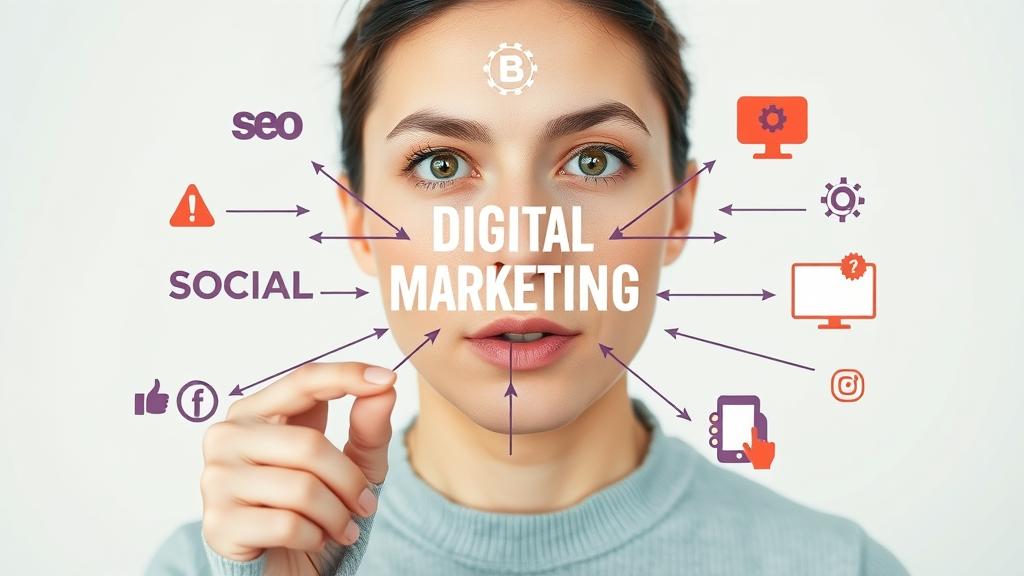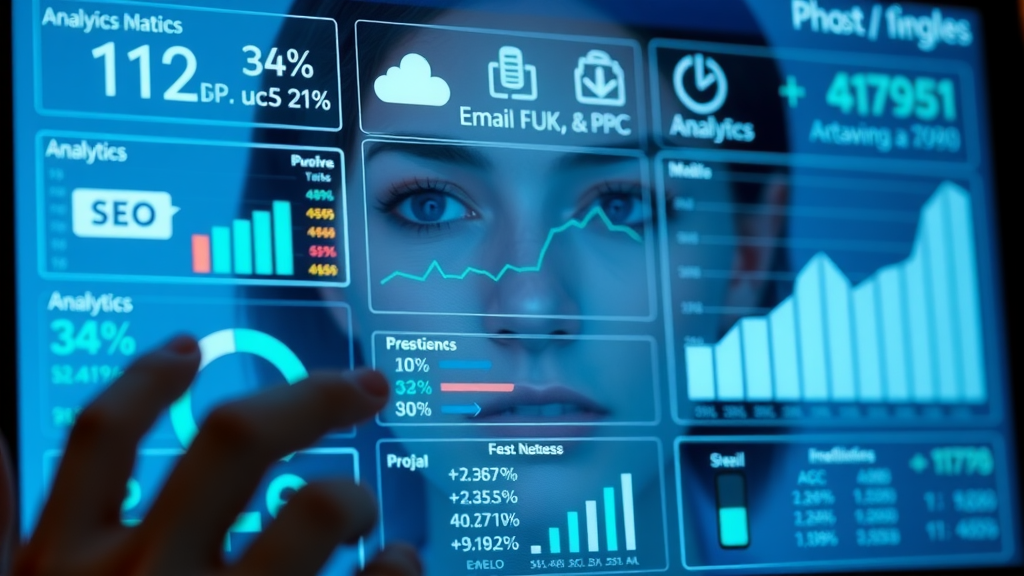Did you know that over 72% of companies increased their revenue by shifting their focus to digital marketing strategies? In today’s fast-paced digital world, traditional marketing alone can leave your business struggling to keep up with competitors. Digital marketing has rapidly transformed how brands connect with customers, drive sales, and build lasting loyalty. Whether you’re a small startup or a large enterprise, understanding and utilizing digital marketing might just be the game-changer your business needs.
Opening Insights: The Surprising Power of Digital Marketing
"Over 72% of companies increased their revenue by shifting their focus to digital marketing strategies."
Digital marketing isn’t just a buzzword. It represents an entirely new approach to reaching your target audience where they are most active—online. From search engines to social media and email campaigns, this wide range of digital channels enables businesses to engage with potential customers 24/7. Unlike traditional marketing, where outreach is often broad and difficult to measure, digital marketing can be precisely targeted and its impact is transparent through advanced analytics. Companies leveraging online marketing see greater brand awareness, higher conversion rates, and improved customer relationships. This powerful shift is essential for businesses wanting to adapt, grow, and thrive in a modern marketplace.

What You'll Learn About Digital Marketing
- The core fundamentals of digital marketing
- The 7 essential types of digital marketing
- How to craft effective marketing strategies for your business
- The role of a digital marketer and key skills required
- Actionable steps to launch your own digital marketing campaign
- How social media and other digital channels drive growth
- Answers to common digital marketing questions
Understanding Digital Marketing: A Comprehensive Overview
What is Digital Marketing?
Digital marketing is the use of online platforms and digital channels to promote products and services to potential customers. It encompasses a wide range of marketing strategies, including search engine optimization (SEO), content marketing, social media campaigns, email marketing, mobile app promotions, and affiliate marketing. Unlike traditional methods, digital marketing allows businesses to precisely target their audience based on data-driven attributes like demographics, behaviors, and interests, making every marketing campaign far more efficient and measurable. With the majority of consumers spending hours daily online, leveraging these digital marketing channels has become foundational to brand success.

The Evolution from Traditional Marketing to Digital Marketing
The shift from traditional marketing—think TV, print ads, and billboards—to digital marketing has been rapid and profound. While older marketing strategies focused on broadcasting messages to a broad, often uninterested audience, digital marketing leverages technology to create highly targeted, interactive campaigns. Businesses are now able to reach their ideal target audience via social media platforms, search engines, and online ads with pinpoint accuracy. The ability to measure campaign success in real time, adjust spending, and personalize messaging has given digital marketers an unprecedented advantage, making the digital path a must for brands aiming to stay competitive.
Key Benefits of Embracing a Digital Marketing Strategy
Embracing a digital marketing strategy unlocks measurable results such as improved customer engagement, higher ROI, and unparalleled flexibility. Digital marketing allows businesses to scale campaigns based on budget and reach potential customers across multiple digital channels from a single dashboard. Marketing managers can optimize strategies on the fly, experiment with different platforms, and fine-tune messaging for specific segments. Data-driven decisions lead to better targeting, increased conversion rates, and sustainable business growth. Moreover, the reach and personalization possible with digital marketing are unmatched in the traditional marketing landscape.
| Aspect | Traditional Marketing | Digital Marketing |
|---|---|---|
| Reach | Local/Regional | Global/Targeted |
| Cost | High, fixed costs | Flexible, scalable budgets |
| Measurability | Difficult to track | Highly measurable (analytics & KPIs) |
| Flexibility | Limited once launched | Real-time changes possible |

The 7 Types of Digital Marketing Explained
1. Search Engine Optimization (SEO): Boosting Visibility on Search Engines
SEO is the art and science of optimizing your website and content to rank higher on search engines like Google and Bing. By improving your site’s structure, keywords, and relevance, you increase your chances of attracting organic (unpaid) traffic. SEO is foundational, as most online experiences begin with a search engine. From on-page optimization (like quality content and keyword targeting) to off-page strategies (like backlinks and domain authority building), investing in strong search engine optimization will help your business reach customers searching for what you offer.
2. Content Marketing: Creating Value with Engaging Content
Content marketing focuses on creating and distributing valuable, relevant, and consistent content to attract and engage your target audience. This can include blog posts, videos, infographics, podcasts, and more. Effective content marketing builds trust, establishes thought leadership, and supports the buyer’s journey by answering questions and providing solutions. The key is to offer content that solves problems, entertains, or educates—ultimately guiding potential customers toward making a purchase decision.
3. Social Media Marketing: Building Community on Social Media Platforms
Social media marketing uses platforms like Facebook, Instagram, Twitter, LinkedIn, and TikTok to strengthen brand awareness, build community, and nurture relationships with target audiences. By actively posting, responding to comments, and leveraging advertising on social media platforms, businesses can reach customers in real time and create powerful engagement loops. Social media marketing is vital for brand loyalty and viral exposure, as well as for amplifying the reach of your other digital marketing channels.

4. Email Marketing: Personalized Connections at Scale
Email marketing remains one of the most effective digital marketing strategies, providing a direct channel to your audience’s inbox. Through newsletters, promotional offers, and personalized updates, businesses can nurture leads, celebrate loyal customers, and drive conversions. The real strength of email marketing is its ability to segment recipients, send tailored content, and analyze engagement metrics (open rates, click-throughs) to refine campaigns over time. For both B2C and B2B businesses, email marketing delivers high ROI when managed with care and creativity.
5. Affiliate Marketing: Expanding Reach through Partnerships
Affiliate marketing enlists third-party promoters (affiliates) to market your products or services. Affiliates earn a commission for bringing in leads or sales, making this a low-risk, performance-based digital marketing channel. Working with bloggers, influencers, and dedicated affiliate programs, businesses can tap into new audiences with minimal upfront investment. The trust affiliates hold with their followers makes recommendations more credible and can rapidly expand your reach.
6. Mobile Marketing: Reaching Audiences on the Go
As mobile device usage surges, mobile marketing has become indispensable. Strategies include app-based advertising, SMS campaigns, mobile-friendly websites, and push notifications. Mobile marketing ensures your brand message is seen whenever and wherever your potential customers are—from browsing products during a commute to reacting to a limited-time offer through an app alert. With consumers spending more time on mobile than desktop, this marketing channel is critical to a successful digital marketing strategy.
7. Pay-Per-Click (PPC) and Online Marketing Campaigns
PPC advertising enables businesses to appear instantly in search engines and digital channel placements by bidding on keywords relevant to their products and services. You only pay when someone clicks on your ad, making it a cost-effective method to drive quick, measurable results. Google Ads, Bing Ads, and social networks all offer advanced PPC options. Combining PPC with robust analytics gives companies the tools to fine-tune their online marketing efforts, quickly scale campaigns, and maximize their marketing budget.
- Advantages and disadvantages of each digital marketing channel
- Common platforms and strategies in use

As you explore the many facets of digital marketing, it's important to remember that content creation is a cornerstone of audience engagement. For practical tips on producing compelling posts and visuals that truly resonate, check out these proven approaches to social media content creation that captivates audiences.
Crafting an Effective Digital Marketing Strategy
Identifying and Understanding Your Target Audience
The foundation of any strong digital marketing strategy is a deep understanding of your target audience. By analyzing demographics, interests, online behaviors, and purchase patterns, you can craft messages that resonate and convert. Utilizing tools like Google Analytics, Facebook Insights, and industry research, marketers identify personas and customer journeys that inform content, offers, and timing. The better you know your customers, the more relevant and effective your campaigns will be, maximizing ROI across all digital channels.

Setting Digital Marketing Objectives and KPIs
Clear, measurable goals—like increasing website traffic, generating leads, or boosting sales—are essential for digital marketing success. Key Performance Indicators (KPIs) such as conversion rate, click-through rate, and return on ad spend (ROAS) let you track progress and optimize efforts. Setting SMART objectives (Specific, Measurable, Achievable, Relevant, Time-bound) aligns your digital marketing strategy with overall business goals and helps teams stay focused.
Selecting the Right Digital Channels
Your choice of digital channels depends on where your audience spends time and how they prefer to engage. B2B marketing may prioritize LinkedIn and email marketing, while B2C brands might focus on Instagram, Facebook, and influencer partnerships. Strategic channel selection improves campaign efficiency, increases engagement, and ensures marketing resources are maximized for the best returns.
Balancing Content Marketing and Media Marketing
Successful digital marketing strategies strike a balance between content creation (blogs, videos, guides) and media marketing (paid ads, partnerships). Content marketing builds long-term trust and organic traffic, while media marketing delivers rapid visibility and conversions. By analyzing engagement data and market trends, businesses can allocate resources effectively and maintain both immediate and sustainable growth.
"Successful digital marketing strategies are agile—allowing businesses to quickly pivot based on data and trends."
The Role of Social Media in Modern Digital Marketing
How Social Media Platforms Impact Brand Awareness
Social media platforms have revolutionized brand visibility by making it possible to reach massive audiences quickly and authentically. Through interactive posts, viral content, and shareable campaigns, businesses can foster brand awareness, loyalty, and community. Real-time engagement gives companies immediate insights into customer needs, while user-generated content amplifies trust and reach organically. Social media marketing is no longer optional—it’s central to every competitive marketing strategy.

Choosing the Best Social Media Platforms for Your Business
Not all social media platforms are created equal for every business. Identifying which channels align with your brand, audience, and objectives is key. Visual brands tend toward Instagram and Pinterest, B2B toward LinkedIn, and consumer-facing brands excel on Facebook and TikTok. By analyzing competitor presence and audience activity, marketers can prioritize the best platforms, streamline efforts, and maximize ROI from their social media marketing.
Integrating Social Media Marketing Into Broader Digital Marketing Strategies
Successful campaigns don’t operate in silos. Integrating social media marketing with SEO, content marketing, and email marketing ensures messages are consistent and mutually reinforcing. Cross-channel promotions, retargeting, and collaborative campaigns help businesses amplify their impact, collect meaningful data, and build unified brand experiences that drive long-term growth and loyalty.
Digital Marketers: Skills, Roles, and Career Pathways

What Does a Digital Marketer Do Exactly?
A digital marketer plans, develops, and executes campaigns across multiple digital marketing channels—like search engines, social media, email, and affiliate marketing. They analyze data, run A/B tests, and leverage analytics to optimize strategies and content. Their ultimate goal: to deliver measurable results, increase brand awareness, generate leads, and drive sales. With the digital landscape evolving constantly, digital marketers must remain agile, creative, and data-driven in everything they do.
Essential Skills for Successful Digital Marketers
Successful digital marketers need a blend of creative thinking, analytical skills, and technical expertise. Mastery of SEO, social media, content creation, and analytics platforms is crucial. Strong communication skills allow them to translate data insights into compelling strategies, while adaptability and an eagerness to learn keep them ahead of digital trends. Many also possess a background in marketing management or communications, and some specialize in specific areas like PPC, email marketing, or content strategy.
Career Progression for Digital Marketers
As demand for digital marketing expertise grows, so do the career opportunities. Entry-level roles can progress to digital marketing managers, strategists, content leads, or even Chief Marketing Officer (CMO) positions. Many digital marketers also branch out as consultants or agency founders. Continuous learning and specialization in hot areas like data analytics or mobile marketing ensure steady advancement and excellent earning potential.
How to Start Your Digital Marketing Journey
Step-by-Step Guide to Launching Your First Digital Marketing Campaign
Starting in digital marketing doesn’t require a huge budget—just a willingness to learn and the right approach. Here’s a step-by-step roadmap to launching your first successful campaign and seeing real business results:
- Define your objectives and audience
- Select the right digital marketing channels
- Create compelling content
- Launch and monitor your campaign
- Measure, analyze, and optimize for better results

"Getting started with digital marketing is less about large budgets and more about smart, strategic execution."
Digital Marketing Metrics: Measuring Success
Key Performance Indicators (KPIs) in Digital Marketing
Measuring success is at the heart of effective digital marketing. Common KPIs include website traffic, bounce rate, conversion rate, click-through rate, and cost per acquisition. Advanced metrics, like customer lifetime value and return on ad spend, give even deeper insight. By tracking the right KPIs, digital marketers get a clear picture of what’s working and what isn’t—empowering smarter decisions and ensuring every marketing campaign delivers value.

Tools for Analytics and Reporting
Platforms like Google Analytics, SEMrush, Hootsuite, and Mailchimp provide robust tracking, visualization, and reporting tools for every marketing channel. These solutions help marketers collect valuable data, track campaign performance, identify trends, and uncover opportunities. Clear reporting enables transparent communication across teams and streamlines ongoing optimization on every digital channel.
How to Use Data-Driven Insights to Refine Your Marketing Strategy
Data-driven insights are the digital marketer’s secret weapon. By analyzing campaign metrics, audience behaviors, and conversion data, businesses can identify underperforming tactics, invest more in winning strategies, and pivot quickly to capture new opportunities. Iteration—testing, learning, and optimizing—is at the core of digital marketing’s power to drive sustainable growth.
Challenges and Opportunities in Digital Marketing
Common Obstacles for Businesses Entering Digital Marketing
Despite its advantages, digital marketing isn’t free from challenges. Businesses may struggle with selecting the right digital channels, devising effective marketing strategies, or managing multiple campaigns at once. Other hurdles include keeping up with changing algorithms, privacy regulations, and the need for constant content creation. However, these obstacles are manageable with ongoing education, experimentation, and the right technology. Every setback can be a learning opportunity—those who persist gain a significant competitive edge.

Emerging Trends and Future Opportunities
As we move deeper into 2024 and beyond, digital marketing is rapidly evolving. Artificial intelligence, automation, voice search optimization, video-first strategies, and the integration of AR/VR are offering new ways to reach and engage audiences. Social commerce and shoppable posts are driving e-commerce growth, while actionable analytics fuel deeper personalization. Staying ahead means being open to innovation, investing in continuous learning, and leveraging partnerships for greater reach.
People Also Ask About Digital Marketing
What does a Digital Marketer do exactly?
- Digital marketers design, execute, and evaluate online marketing campaigns using various digital marketing channels (SEO, social media, email, content, affiliate, and more). They plan marketing strategies, analyze data, and optimize campaigns to achieve organizational goals.
What are the 7 types of digital marketing?
- The 7 types are: Search Engine Optimization (SEO), Content Marketing, Social Media Marketing, Email Marketing, Affiliate Marketing, Mobile Marketing, and Pay-Per-Click (PPC) or Online Marketing.
How do I start my digital marketing?
- Begin by understanding your target audience, setting measurable goals, choosing effective digital marketing channels, and creating value-driven content. Use analytics to continually improve your approach.
What does a Digital Marketer make?
- Digital marketer salaries vary based on experience, role, and location. Entry-level digital marketers can expect $40,000–$60,000 annually, with experienced professionals earning $80,000+.
Key Takeaways: Is Digital Marketing Right for Your Business?
- Digital marketing offers scalable, measurable strategies for business growth
- Leveraging the right digital marketing channels is essential for modern success
- Adapting to trends and continuous learning are keys to competitive advantage
Frequently Asked Questions About Digital Marketing
-
How can small businesses benefit most from digital marketing?
Small businesses can use digital marketing to reach a targeted audience, compete with larger brands, and achieve measurable growth while controlling costs. Highly targeted campaigns—like local SEO and social media—can deliver substantial ROI. -
Which digital marketing strategy yields the fastest results?
Pay-Per-Click (PPC) and social media ads typically deliver the fastest results, generating traffic and leads soon after launch. For sustained long-term growth, combine these tactics with content marketing and SEO. -
How do you measure ROI in digital marketing?
ROI in digital marketing is measured by comparing campaign costs to generated revenue, factoring in KPIs such as conversion rate, cost per acquisition, and lifetime customer value. Analytics platforms automate much of this measurement process for accuracy. -
What is the difference between inbound and outbound digital marketing?
Inbound marketing attracts customers through valuable content—like blogs, SEO, and social media—while outbound marketing pushes messages through paid ads, emails, and direct outreach. Digital marketing excels in both approaches, but today’s buyers often prefer inbound strategies.
Conclusion: Embracing Digital Marketing for Future Success
"Digital marketing isn’t just a trend, it’s an evolving necessity for businesses wanting to thrive in a digital-first world."
Embrace digital marketing now to ensure your business thrives, not just survives. The future belongs to brands that innovate and connect with customers in the digital sphere.
If you’re ready to take your digital marketing to the next level, consider how a strong brand identity can accelerate your results. Mastering branding techniques not only amplifies your online presence but also builds trust and recognition in a crowded marketplace. Discover actionable strategies and expert insights in unlocking branding techniques that boost your business fast. This next step could be the catalyst that transforms your marketing efforts into lasting business growth.
Need Help? Call Digital Media Marketing at 1-586-997-0001
- For more information read The Ultimate Guide to Online Reputation Management: Strategies, Tools, and Best Practices.
 Add Row
Add Row  Add
Add 




Write A Comment